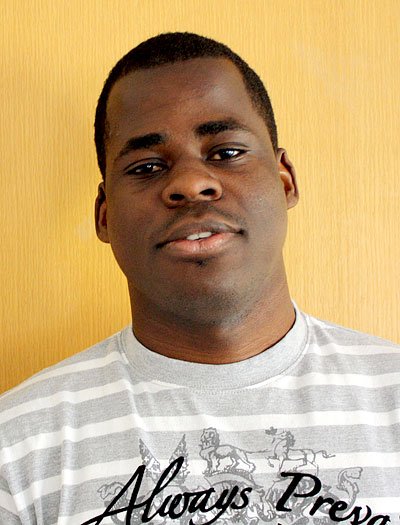Assets frozen because of unrest in home country, WWU student struggles to make do in Bellingham
Last January, 26-year-old Dennis Amien left the Republic of Côte d’Ivoire, the only home he had every known. He traveled halfway around the world from West Africa to Bellingham with two goals: to learn to speak fluent English and to earn his bachelor’s degree and MBA from Western Washington University.
With his first two months of rent pre-paid and an associate’s degree under his belt, Amien arrived at WWU and started the university’s Intensive English Program. But just a few weeks after he settled in at WWU, Amien’s living conditions took a drastic turn.
Côte d’Ivoire saw its first presidential election in 10 years in November 2010, and with it an uproar of political backlash when conflicting results were announced. Amien had left Abidjan, Cote d’Ivoire’s largest city and the target of a political militia, just weeks before the demonstrations became full-blown. He’d been in Bellingham for three weeks when he saw the extreme violence in his home city via online news. Concerned for the safety of his parents and younger sister, Amien reached his mother on the telephone. She told him that militia fighters had kidnapped his father.
Surrounded by extremely unsafe conditions, Amien’s mother and sister fled Abidjan, as did hundreds of thousands of other residents, to escape the political mayhem. The city was shut down, including its banks, and with it Amien’s access to his family’s finances.
“After being here for just three weeks I had no money, so I called my mom, and then she told me about what had happened to my dad,” Amien says. “I felt very bad. I don’t have anyone here, nobody here to help me, so it’s been very difficult for me. In my mind I had given up. Maybe I should stop studying? Maybe I should go back to my country to be with my family? I didn’t know what to do, because my father was not here, and he was not there, and my mother needed help. It was difficult to live here, but it would have also been difficult to go back to my country. I did not know what I should do.”
Amien has had no access to money for his education, housing, clothing or food since the Abidjan banks closed in January. According to WWU’s Intensive English Program Director Steve Robinson, there are no state funds available to help Amien, as the IEP is entirely self-supporting, meaning it is not funded through the university. Amien is allowed to be employed only at an on-campus job due to the regulations of his international student visa. WWU’s dining services gave him a job working roughly 10 hours per week, with a few free meals per week as well. While this is helpful, it is not enough money for Amien to be financially sufficient.
Robinson has given Amien a scholarship that covers this quarter’s tuition and book costs, and a gracious woman in the Bellingham community is currently hosting him in her home for free. However, once summer comes and a new academic quarter begins, Amien will be back to where he was just months ago – needing a new place to stay and enough money to cover tuition, school supply fees, and, ideally, some financial compensation for his next host family.
Intensive English Program Lecturer Donna Germaine has worked with Robinson to find Amien his current housing, and she also footed the $1,800 bill for Amien’s emergency root canal last month.
Germaine says that the department occasionally gains students in strange or pressing situations, but that Amien’s current circumstance is new to the entire departmental staff. “I’ve been here 12 or 13 years, but this is absolutely new,” she says. “We’ve never had this happen, where a father signed papers showing he had plenty of money and everything was fine, and then boom – civil unrest in the country.”
Amien is a conditional admission undergraduate, preparing to enroll in regular classes, and Germaine and Robinson describe him as a bright, top-of-the-line student. But at this stage in his education, he can only take self-supporting, non-credit English language classes.
“If Dennis were a matriculated student at this point, there would be more options for him,” Germaine says. “We’re hoping that we can start getting him into at least one class to get that process going. For now, he’s not a regular WWU student as such, not an exchange student, not one of my kids that was brought up here in Washington. I think it’s the first time anyone has run into this situation, period.”
Amien’s father was recently found safe in Liberia, and will remain there indefinitely until conditions improve in Abidjan. His mother and sister are also indefinitely displaced to avoid the political unrest.
“I want to say thanks to my director, my teacher and my host family,” Amien says. “It is not easy to live away from your family.”
But more help is needed for Amien to meet his goals. Without enough money to sustain him here in Bellingham, Amien will become virtually homeless, as returning to Abidjan would put him in an unsafe, uninhabitable environment.
Hoping to keep Amien enrolled in school and on his feet financially until he can regain access to his family’s finances, Robinson has created an account in Dennis Amien’s name at the Whatcom Educational Credit Union. Monetary donations of any amount would be extremely appreciated by Amien, all of the IEP faculty, staff, and the student’s host family. Amien speaks excellent English, as well as fluent French, and needs a place to call home for the summer, ideally one close to a bus line. Help to pay his $50-per-month phone bill, which provides his only means of contact with his family in Africa, also would be appreciated.
Contact Donna Germaine at (360) 650-7662 or Steve Robinson at (360) 650-6873 for more information on how to keep Dennis Amien on his feet.
